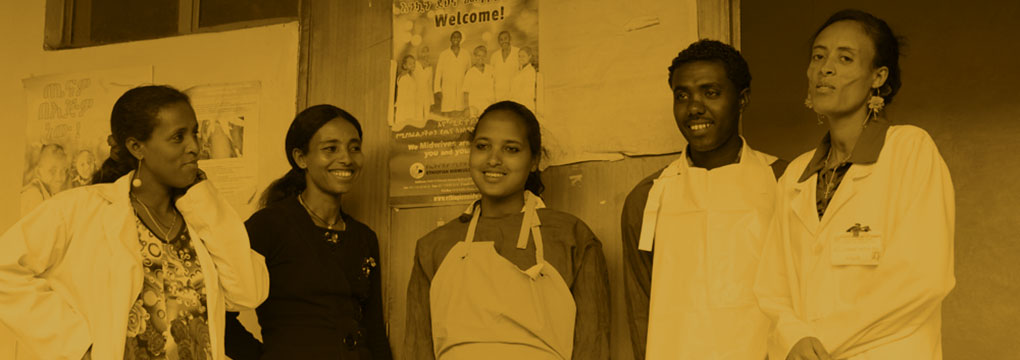The Health Policy Project ended in 2016. Work continued under Health Policy Plus (HP+) until 2022.
Midwifery

Health Policy Project/Ethiopia
Overview
Midwives are the linchpins of effective maternal healthcare systems in developing countries. The United Nations Population Fund (UNFPA) suggests that 60% of maternal and newborn deaths could be averted if all pregnant women in developing countries had access to antenatal care and basic but well-equipped health facilities managed by competent midwives. At present, however, many clinics are overcrowded, understaffed, and not stocked with enough supplies to ensure proper care for women giving birth. Midwives are left to bear the brunt of resource and service gaps in the healthcare system, receiving much of the blame for high maternal and infant mortality rates in their respective countries.
To increase women’s access to high-quality midwifery services, governments need to invest in midwifery and ensure an enabling environment that maximizes midwives’ contribution to maternal and newborn health. Drawing attention to the poor working conditions of midwives and promoting the vital role they play in safe childbirth are key elements to ensure they receive the financial, political, and moral support they need to protect the lives of women and infants.
What We Do
In partnership with the White Ribbon Alliance for Safe Motherhood (WRA), the Health Policy Project (HPP) supports the development of global and national advocacy campaigns to increase support for midwives and demonstrate their value to improving maternal and child health. HPP advocacy efforts focus on creating campaigns that use clear, compelling messages to highlight the shortage of midwives and their substandard working conditions, and urge policymakers to support them through targeted policy commitments and increased funding and resources. The project also works directly with midwives by training them to develop effective advocacy campaigns using a variety of tools, including storytelling and filmmaking. In doing so, midwives become influential advocates for change and contribute to the overall effort to improve maternal and child health within their countries and throughout the world.
Support National Advocacy Initiatives
HPP also supports country-led advocacy initiatives to improve working conditions for midwives in nations where midwives face extraordinary staffing shortages, inadequate medical supplies at health facilities, and public scrutiny. HPP supports WRA’s national-level efforts to develop advocacy campaigns that seek to improve the public perception of midwives and mobilize communities to become advocates in improving the working conditions of midwives. The project’s collaboration with WRA has also helped form parliamentary coalitions that advocate for safe motherhood and garner support from other government leaders to commit greater resources to increase workforce numbers and improve working conditions at service delivery facilities. We also support WRA in providing technical assistance to midwives to strengthen their capacity to provide high-quality services.
Publications and Resources
A Guide for Advocating for Respectful Maternity Care
This guide serves as a comprehensive resource centered on the Respectful Maternity Care charter, a groundbreaking consensus document that demonstrates the legitimate place of maternal health rights within the broader context of human rights.
Advocacy Approaches to Promote Midwives and the Profession of Midwifery
This brief demonstrates how advocacy approaches can lead to a more supportive environment for midwives and ultimately better maternity care and birth outcomes.
The White Ribbon Alliance for Safe Motherhood website
Video: "What I Want is Simple" - Improving Public Perception of Midwives in Tanzania
A short film produced by the White Ribbon Alliance in collaboration with the Health Policy Project to improve the public perception of midwives in Tanzania and mobilize support for advocacy targeting improvements in the working conditions of midwives.
Video: Stories of Midwives
Stories of Midwives is a UNFPA film series that weaves together a diverse array of narratives from the perspectives of midwives, midwifery students, mothers, healthcare workers, community leaders, and others whose lives have been affected by midwives.
Promoting Accountability for Safe Motherhood: The White Ribbon Alliance's Social Watch Approach
This brief outlines social watch techniques that civil society groups can use to hold governments accountable to commitments for ensuring safe motherhood.
Maternal and Neonatal Health Technical Update No.1: Promoting Safe Motherhood through Midwife Training and Advocacy
This brief developed under the USAID-funded POLICY Project examines successful approaches in leadership and training initiatives for midwives.
News
Fighting for the Right to Safe Motherhood
Rose Mlay, lifelong maternal health advocate, leads push for improved working conditions for midwives and better health for mothers and children in Tanzania.
Midwives in Rwanda Complete Respectful Maternity Care Advocacy Training
The National Council for Nurse and Midwives Rwanda, the White Ribbon Alliance for Safe Motherhood, and the Health Policy Project hosted an advocacy workshop for midwives on March 25-27 in Kigali, Rwanda.

